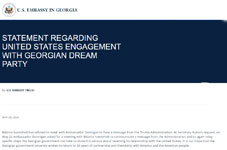
Ivanishvili Refuses Meeting with U.S. Ambassador Amid Escalating Diplomatic Rift
By Liza Mchedlidze
Thursday, May 29, 2025
The diplomatic rift between Georgia and the United States deepened further as Bidzina Ivanishvili, founder and honorary chairman of the ruling Georgian Dream party, declined a formal request to meet with U.S. Ambassador Robin Dunnigan. The United States Embassy confirmed on May 28 that Ivanishvili refused the invitation, which was extended at the request of U.S. Secretary of State Marco Rubio.
According to the Embassy, the proposed meeting was intended to deliver a message from the U.S. administration, offering specific steps the Georgian government could take to repair and stabilize relations with Washington. These diplomatic efforts appear to have failed to gain traction.
The U.S. Embassy stated, "Despite this refusal, we continue to hope that the Georgian government sincerely desires to return to the 33-year friendship and partnership between our nations and our people."
Ivanishvili's refusal comes amid a backdrop of increasing political isolation and international criticism directed at the Georgian government. Following disputed elections in October 2024 and a decisive pivot away from European integration in November, Georgia's relations with Western allies have deteriorated significantly.
On November 30, the U.S. government suspended its strategic partnership with Georgia, a decision made shortly after Georgian Dream leadership announced a pause on EU accession efforts. These moves signaled a sharp departure from the foreign policy trajectory Georgia had pursued since its independence.
Later in December, the U.S. Treasury imposed sanctions on Ivanishvili. The Department cited his role in enabling systemic corruption, facilitating human rights violations, and supporting political shifts that favored the Russian Federation while undermining Georgia's democratic institutions and Euro-Atlantic goals.
The tensions have intensified as the U.S. Congress moves forward with the MEGOBARI Act, legislation aimed at expanding sanctions against Georgian Dream officials. The bill successfully passed the House of Representatives in early May and remains under consideration in the Senate.
Senator Marco Rubio, who has become one of the leading voices shaping U.S. policy toward Georgia, recently described the Georgian Dream government as "anti-American." His remarks reflect growing frustration in Washington over Tbilisi's shifting political course and perceived alignment with authoritarian regimes.
The Georgian government has responded by attempting to minimize the significance of these statements. Officials accused Congressman Joe Wilson of mischaracterizing the party's stance when he echoed Rubio's warning, calling the current leadership "anti-American."
Despite these diplomatic exchanges, Georgian Dream has signaled a desire to reset relations with the United States, particularly under the renewed presidency of Donald Trump. The party has claimed that its political philosophy shares values with the Trump administration, especially its campaign against what it calls the "deep state."

